What is Greece famous for? Here's 18 things Greece is well known for, including beautiful islands, mythology, UNESCO sites, great food and more!
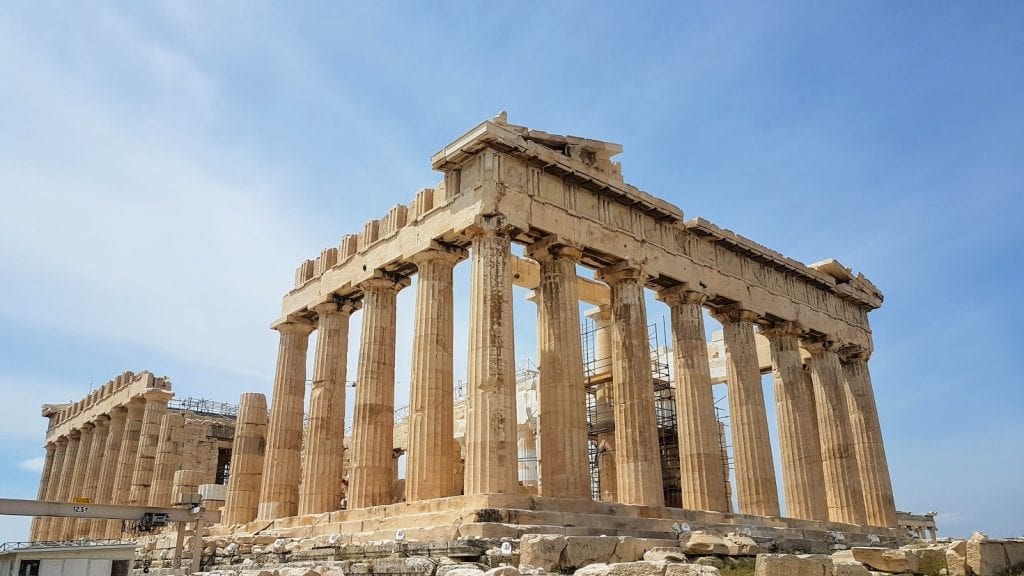
What is Greece known for?
The Birthplace of Democracy and the Cradle of Western Civilization – just two of the phrases used to describe Greece and its influence upon the world lasting over two thousand years!
This small country situated in the south of Europe is famous for a number of things. To some, it's the ancient civilization, and its contributions to the fields of theatre, philosophy, mathematics and medicine. To others, Greece is the ultimate holiday destination, basking in sunshine and ringed with beautiful beaches.
We've come up with 18 interesting things that people associate with Greece. Read on to find what Greece is famous for and the best way to experience it for yourself!
1. The Greek Islands
Think of Greece, and images of white-washed houses and sparkling clean waters will immediately come to mind. The Greek islands are famous around the world.
Greece boasts a coastline of 13,676 km, and the total number of Greek islands exceeds a whopping 2,500, or 6,000 according to some sources! With around 170 of them being inhabited, chances are you will find your own Greek paradise when you visit!
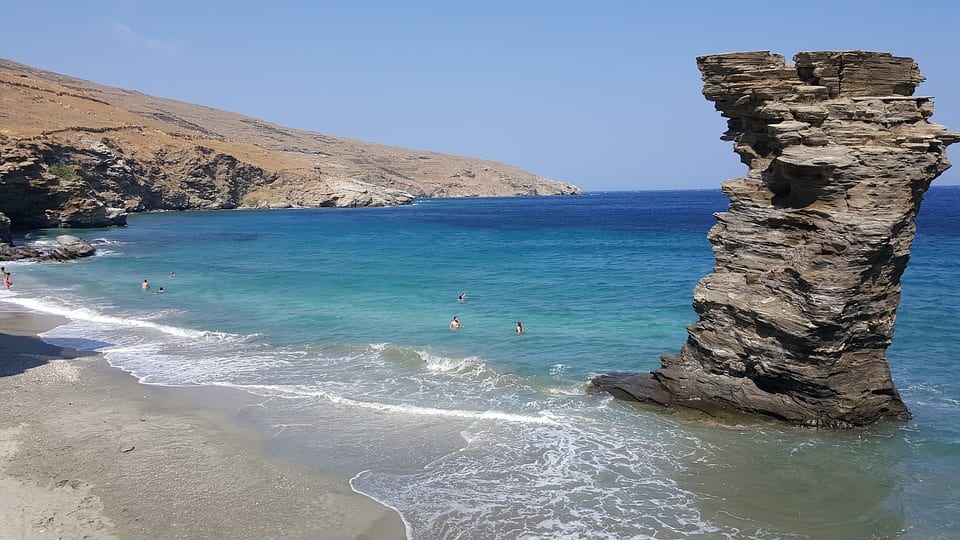
Crete is Greece’s biggest island and Evia the second biggest. Apart from them, most of the Greek islands are grouped together.
The most important groups of islands are the Cyclades, the Dodecanese, the Ionian Islands, the Sporades, the Northeastern Aegean and the Argosaronic islands.
Experience it yourself by…. Greek Island Hopping!
Spend 2 nights on one island, then catch a ferry to another, and another, and another!
The Cyclades are one of the most popular island chains to go Greek island hopping, but you can also go Greek island hopping on the other island chains.

The majority of the Greek islands can be reached from Piraeus port in Athens. Bigger islands have international airports and can be reached directly from Athens as well as several European countries.
Island chains typically have ferries that connect with one another, but one island chain does not necessarily connect with another one.
Check a map before planning a Greek island hopping route that includes Ithaca, Lesbos, and Santorini!
2. Santorini
Special mention goes to the most popular Greek island, Santorini. The sunset views from Oia, the northernmost village of this small island, are many people’s answer to the question “What is Greece famous for”.
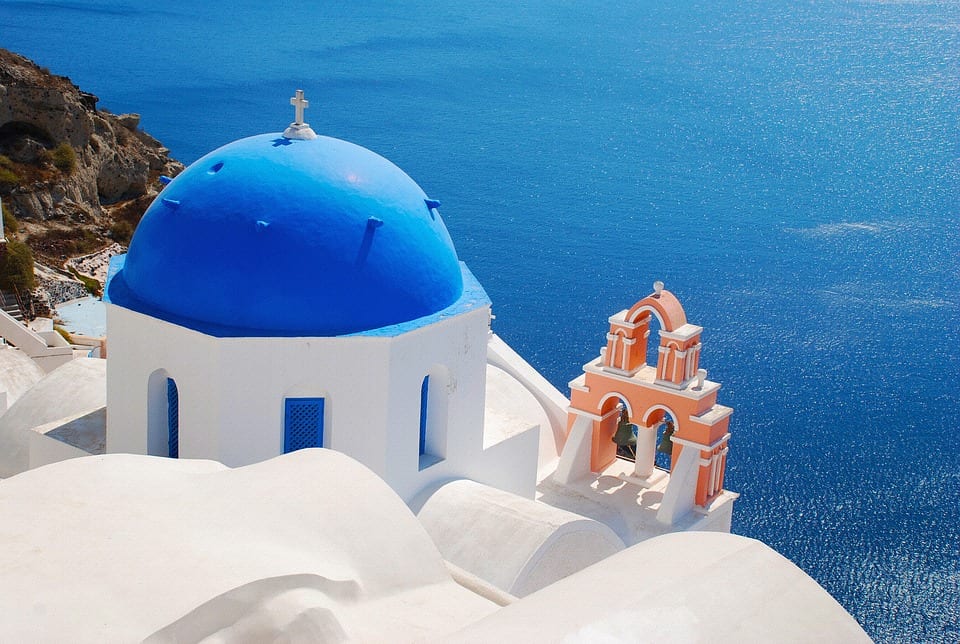
Everyone has seen those photos of blue domed churches and white-washed walls. It seems to ooze chic elegance.
Experience it yourself by… Visiting Santorini in off-season
In our very honest opinion, Santorini will be better enjoyed and appreciated in the off-season – we visited in November and absolutely loved it.
Here are some ideas on what to do in Santorini if you decide to visit.
3. The Acropolis and Parthenon
It’s impossible to sum up the ancient complex of the Acropolis in Athens in just a few lines. The site contains many ancient temples and buildings, the most important of which is the Parthenon.
Most of the temples were constructed during the Golden Age of Pericles, in the 5th century BC.
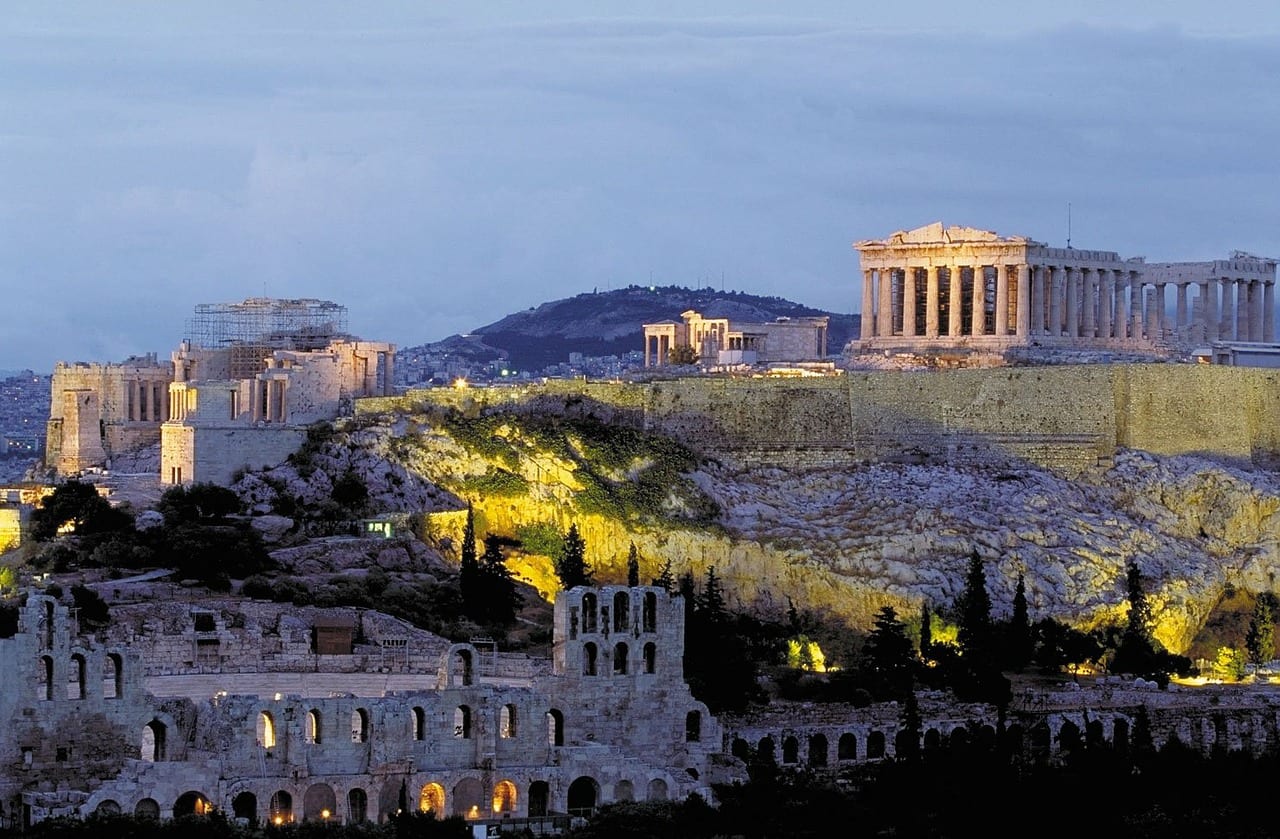
You can visit this awesome UNESCO World Heritage Site on your own. At the same time, you might enjoy a guided tour if you want to find out more about its history, the architecture and the social context at the time.
Experience it yourself by… Choosing your time wisely
It can get hot at the top of the Acropolis! Convention says that people should arrive early in the summer to avoid the heat of the day.
I think it may be a better idea to visit the Acropolis between 17.00 and 20.00 though, when there are no coach tours, and the cruise ship passengers have returned to their boats.
Read more here: Facts about the Acropolis and Parthenon.
4. Ancient Greek mythology and the Olympian Gods
Ancient Greek mythology is known around the world, and it seems that most people have heard of at least one myth.
Some popular Ancient Greek myths include Odysseus’ journey back home to Ithaca, naming of the city of Athens after the goddess Athena, the legend of Theseus and the Minotaur, and Jason and the Argonauts.
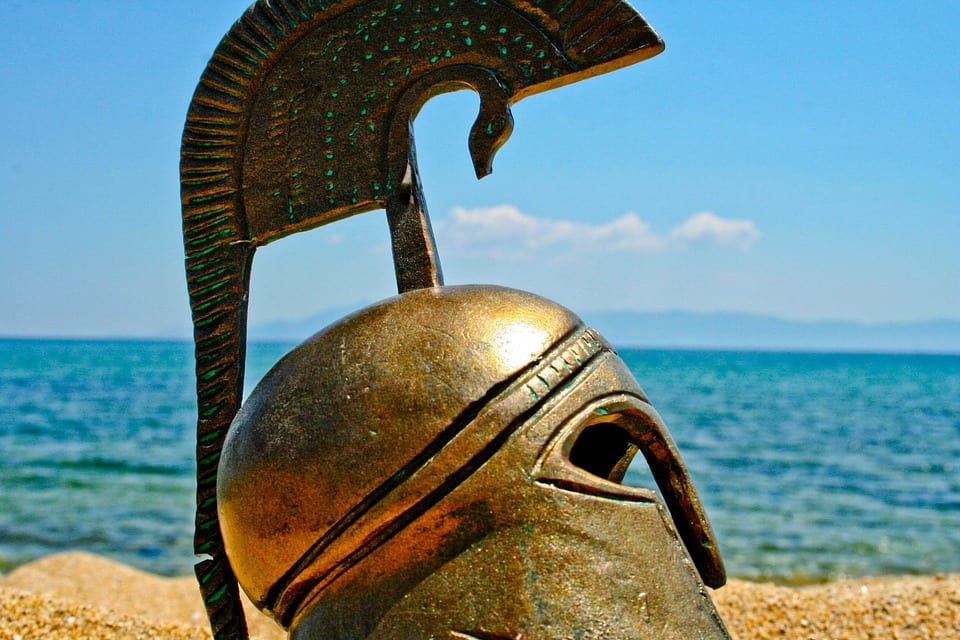
It is likely that Ancient Greek mythology goes back to the 18th century BC, though there is no written evidence from the time. Homer’s Iliad and Odyssey and Hesiod’s Theogony and Works and Days are the earliest known sources.
They discuss the origin of the world, the numerous gods and heroes, and shed some light on the customs, institutions, practices and lives of the Ancient Greeks.
The twelve Olympian Gods feature in all aspects of Ancient Greek Mythology. Unlike later gods in other religions, they share negative human traits, such as lust, envy and wrath.
The twelve Gods lived on Mountain Olympus, Greece’s tallest mountain, and each of them had specific functions. The later Roman Gods are based on the Greek Gods. More here on Greek mythology and fun facts about Greece.
Experience it yourself by… Visiting Ancient Olympia
Whilst almost any museum connected with Ancient Greece will feature aspects of Greek Mythology, the Museum at Ancient Olympia has a wonderful collection of sculptures.
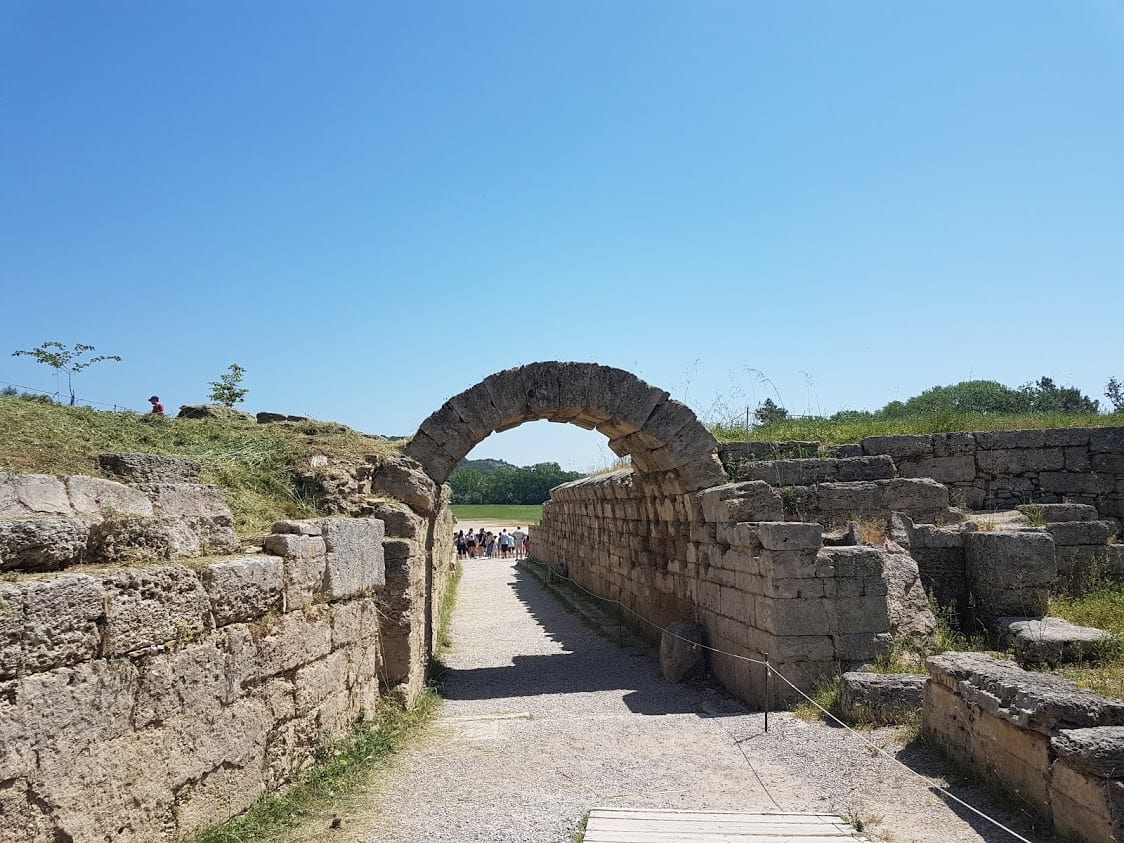
Central to these are a series depicting the myth of Hercules and the 12 Labours. If you're interested in Greek mythology, be sure to add a visit to Olympia in the Peloponnese to your itinerary!
Also: try a Greek Mythology tour in Athens.
5. Greek philosophers
Philosophy, the search for the meaning of life, emerged at some point in the 6th century BC. Philosophy aimed to explain life outside religion, and promoted sciences and logic, but also politics and ethics.
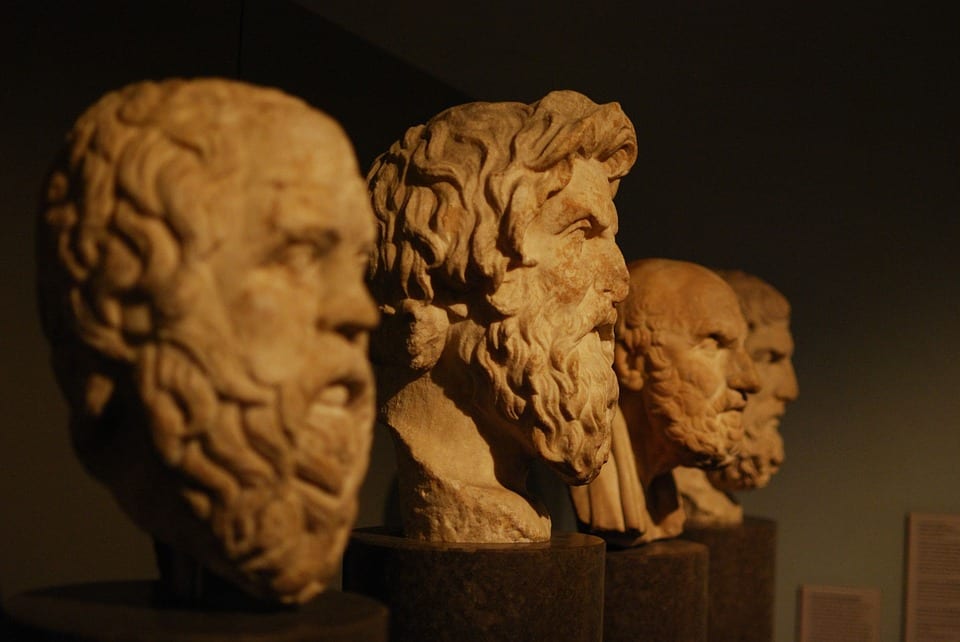
Several Ancient Greek philosophers, such as Socrates, Plato and Aristotle, are still relevant today. Many later philosophers, like Epicurus, Seneca, Epictetus and Marcus Aurelius were influenced by the Ancient Greeks.
Experience it yourself by… visiting Plato's Academy Museum
Surprisingly, there weren't any museums dedicated to Philosophy in Athens until Plato's Academy Museum opened a few years ago. It's an interactive museum which explains the life and philosophy of Plato. Find out more here: Plato's Academy Museum.
6. The Birthplace of Democracy
Greece is known as the birthplace of democracy, which effectively means “people power”. This political system was introduced in Athens in ancient times, just before the Golden Age of Pericles.
Although ancient democracy was very different to what we know as democracy today, it was a first attempt for the people to be able to actively participate in the city’s issues.
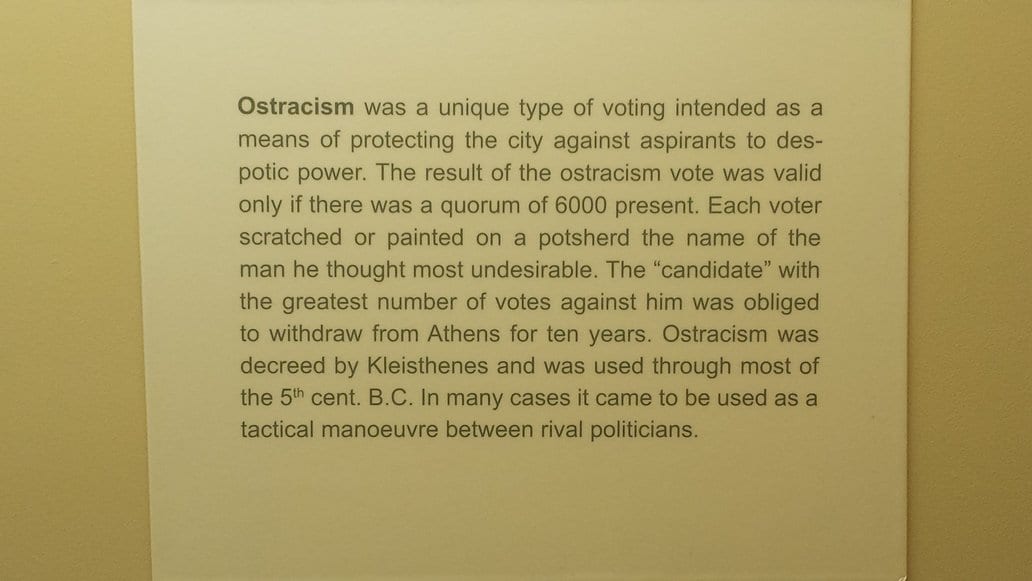
All male citizens of Athens who had undergone military training could take part in the Assemblies, meetings that were held a few times a year. The election process was only reserved for Athenian males, while women, non-Athenians and slaves were excluded from the procedure.
Originally, the Athenian Assembly had the opportunity to vote for most decisions. It was a powerful body, as it could even ostracize people for up to ten years. Later on, some of the Assembly’s power was transferred to the courts.
Alongside the Assembly, there was also a public body of 500 people called the Boule (Parliament). Their responsibility was to guide the work of the Assembly and make sure the Assembly’s decisions are executed.
Although people in the Boule were supposed to be chosen at random on an annual basis, there are indications that they were often prominent Athenian citizens and their relatives.
Look here for more interesting facts about Athens.
Experience it yourself by… Voting the next time there's an election!
Put people power into practice the next time there's an election by voting!
7. Greek language
Did you know that thousands of words in English come from Greek? Think about philosophy, democracy and history, but also photography, psychology, school, problem, method, type, music, idea, episode, program, apologize, irony, practice, phrase. This is not Greek to you… or is it?
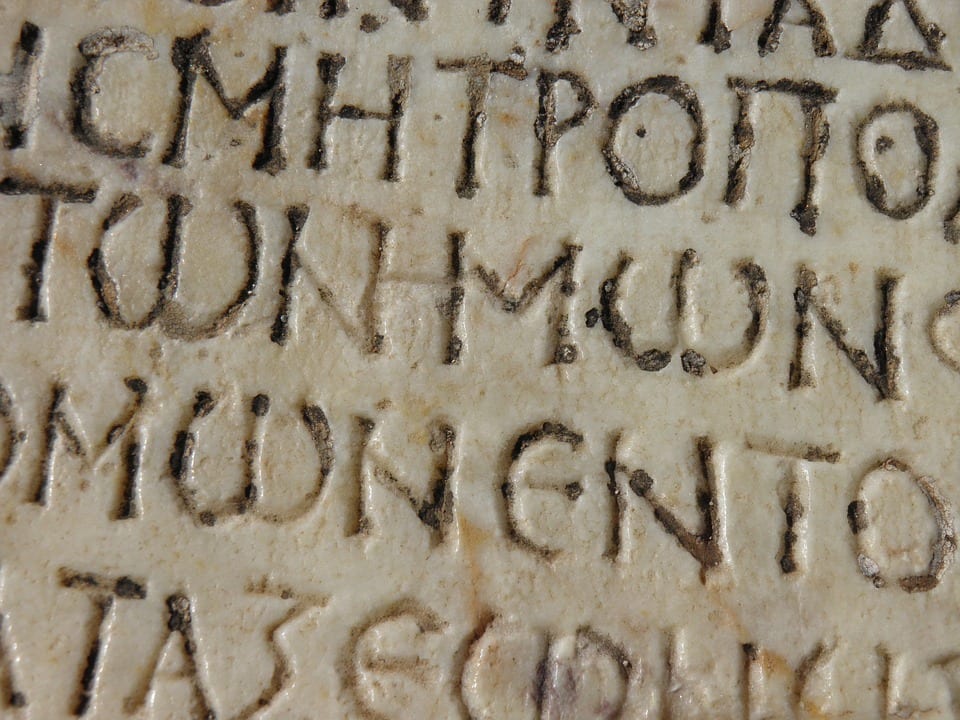
The predecessor languages of Ancient Greek might have developed as early as 4000 BC, though evidence is scarce. The language we refer to as “Ancient Greek” was the language of Iliad and Odyssey, and the language of the Golden Era or Pericles.
This language evolved further in the subsequent centuries, and developed into the so-called Koine Greek, which was widely used during the Hellenistic and Roman period, and became the early Byzantine Empire’s official language.
The New Testament was written in Koine Greek. Modern Greek is not too far-off Koine Greek. These days, a Greek person could more or less read texts written in Koine Greek, almost 2,000 years ago!
Experience it yourself by… Learning a few words before your vacation
While English is widely spoken in Greece, it doesn’t hurt to try and learn a few words before you visit. This article should help. And in case you were wondering, instead of “it’s all Greek to me”, the Greeks say “it’s all Chinese to me”!
8. The Olympic Games
You might know that the first modern Olympic Games took place in Athens in 1896 – but did you know that the first Olympic Games ever were held in Ancient Greece in 776 BC? They were held to honour the King of gods, Zeus, and matches and sports were added at later stages.

The Games took place every four years in Ancient Olympia, and people from all city-states in Greece travelled in order to participate or attend.
During that time, the Olympic Truce came into effect, in order to enable people and athletes to travel and participate safely – this was very important, as the city-states were often at war with each other.
The only people allowed to participate in the Ancient Olympic Games were men of Greek origin who were not slaves. Women were not allowed to participate or even attend the Games, though they were allowed to own chariots that were used for chariot racing.
The Olympic Games were suspended by Emperor Theodosius I in AD 393, as a result of the expansion of the Byzantine Empire. They were reestablished in 1896, with 241 male participants competing against each other. The Games were held again in Athens in 2004.
Experience it yourself by… Visiting the Panathenaic Stadium in Athens
This interesting stadium was rebuilt for the first modern Olympic Games. It also has a couple of interesting rooms containing memorabilia from various Olympic Games around the world. Visiting with your family? Race along the track and see who is the Olympic champion in your family!
9. Greek food
For many visitors, Greek food is one of the reasons they come to Greece. Dishes like mousaka and souvlaki are quite famous around the world.
However, if you want to experience some real Greek food, you absolutely have to come to Greece, preferably outside the main tourist hubs.
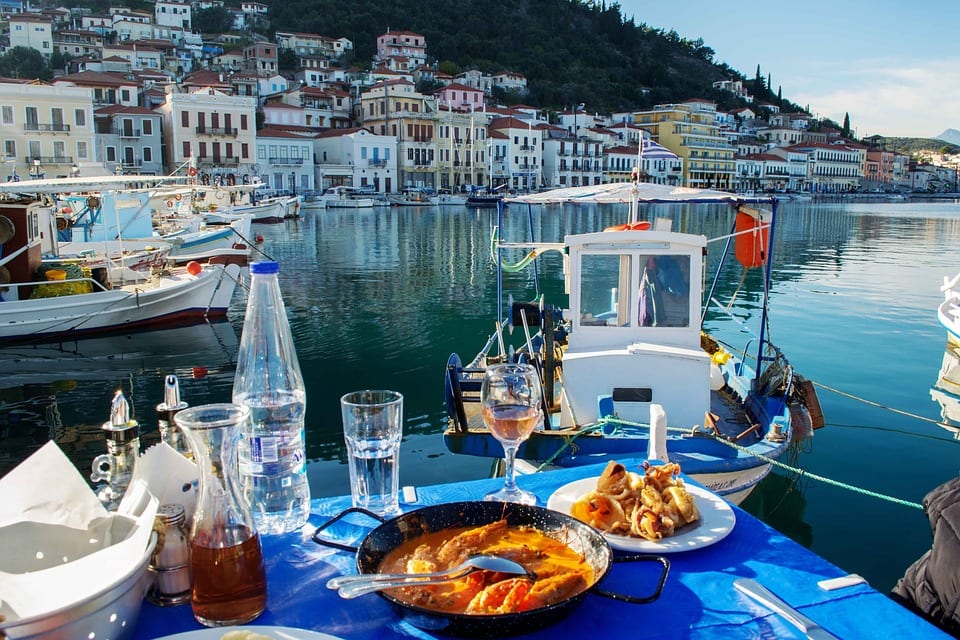
Greek cuisine is fairly rich and very diverse. Vegetables and pulses are used liberally, but meat, poultry and fish are also abundant.
Flavours are generally subtle, with onions, garlic, tomato or lemon and olive oil appearing in most traditional recipes. Some of the staples on the Greek table are bread, served with every meal, olives and feta cheese.
Experience it yourself by… Eating with a big group of people
Greek food is best enjoyed in large groups. This way, you can order multiple dishes and get to try many different things. Greeks eat late, and meals can go on for several hours. Enjoy!
10. Greek Olives and Olive Oil
Do you want a piece of friendly advice? Do not ever, EVER, say to a Greek that olive oil from “another country” is the best. Greeks are super proud of their olives and olive oil, and consider every other olive oil of lesser quality.
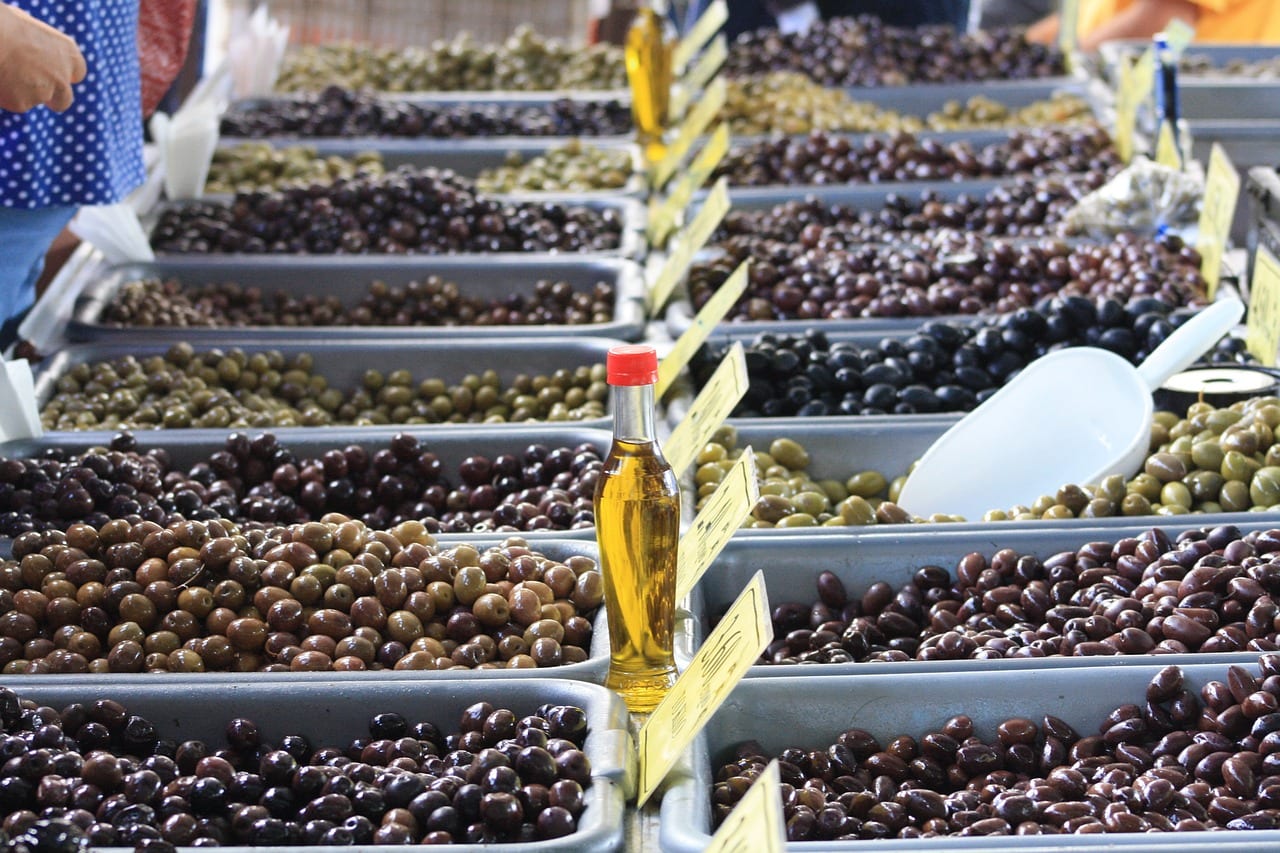
To be fair, though, Greek olives are pretty amazing. There are many different varieties, ranging in color, size and flavor.
The small “Koroneiki” olives are used to produce some of the best olive oil. They can be found in the Peloponnese and Crete, two of the main areas in Greece where great olive oil is produced. An other famous variety is “Kalamon” olives, that are also exported.
Experience it yourself by… Taking an olive oil tasting tour
It won't matter where you go in Greece, there will be an olive oil or olive tasting tour somewhere! Check out Get Your Guide for tours wherever in Greece you plan to visit.
11. Feta cheese
When it comes to cheese, the question “What is Greece famous for?” only has one answer – feta. This white, crumbly cheese is produced in Greece from either 100% sheep milk, or from a combination of sheep and up to 30% goat milk.

What is not widely known though, is that feta cheese is a Protected Designation of Origin product in the EU. As such, the so-called feta cheeses from other EU countries cannot really be named feta. A white cheese containing cow milk is not feta either!
Feta can be eaten in its original form, with bread or in various salads like the famous Greek salad. It is also used in several dishes like tyropita and spanakopita, various omelets and many more.
Experience it yourself by… Ordering a Greek Salad
No trip to Greece is complete without trying at least one Greek salad!
12. Ouzo
An integral part of Greek summer, this strong distilled alcoholic drink is loved by many visitors. With a distinctive anise taste, it will accompany any meal, but goes great with fish. You can choose to drink it watered down, on the rocks or straight, always in great company.

Experience it yourself by… Taking it slowly
If you are not used to strong drinks, take it easy if you want to enjoy your next day. Yiamas!
13. Greek Coffee
Before you visit Greece, you will probably have no clue about the various types of coffee that are popular across the country. The traditional Greek coffee, which is boiled in a pot and served steaming hot, is quite popular.
However, there are several types of cold, iced and hot coffee, such as freddo espresso, freddo cappuccino, the long-established frappe, and other types that you can also find in your country.

What makes Greek coffee unique, is the time it takes to drink it! Coffee drinking is almost a ritual in Greece. Unless you are taking a coffee to go, sitting down for a coffee with a friend normally means a long chat that can easily last for a couple of hours. Check out our article about Greek coffee culture.
Experience it yourself by… Watching the world go by in a cafe
Coffee is not to be rushed in Greece. Order yourself a nice cold frappe or freddo expresso, and sit watching the world go by.
14. UNESCO sites
We have already mentioned the Acropolis – but did you know that Greece has 18 UNESCO sites in total? Spread all around the country, Greece’s UNESCO sites are unique.
From Mycenean to Byzantine sites, from monasteries to medieval castles, Greece’s UNESCO sites are really diverse. Check our comprehensive article to all the UNESCO sites in Greece.
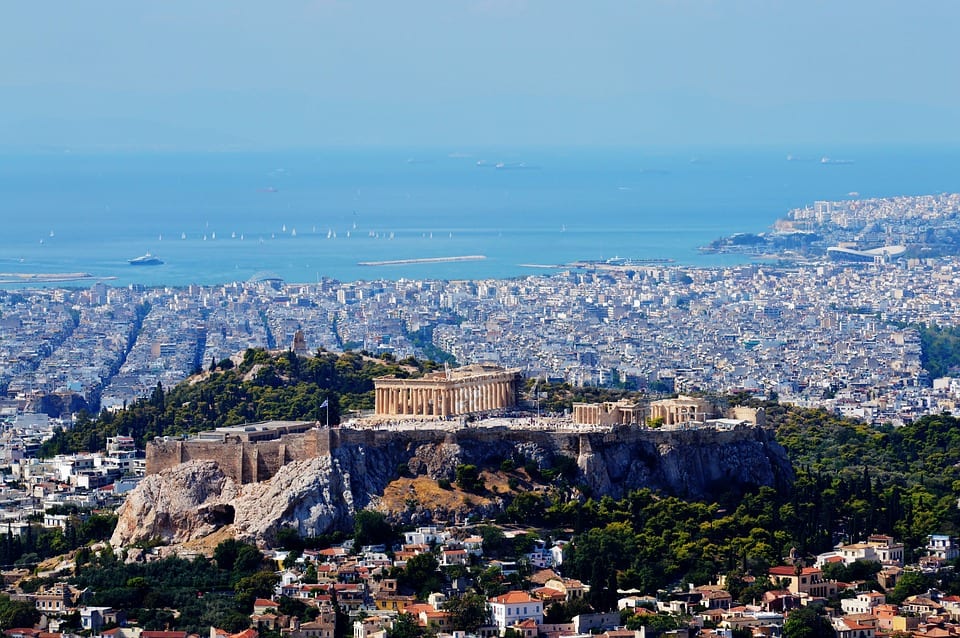
Experience it yourself by… Planning a road trip
Not all the UNESCO sites in Greece are on the mainland, but enough of them are that you could plan a road trip to include all the ones that do. Find out about planning a road trip in Greece.
You could also take one of these tours of Greece from Athens.
15. Greek Monasteries
Although Greece’s best known monasteries fall within the UNESCO sites category, we can’t help making a special mention to the world-famous region of Meteora.
The six active Meteora monasteries are located a few hours north of Athens, in a fascinating area full of tall rocks and impressive cliffs.
You can choose to visit independently, or take a Meteora day trip from Athens if you don’t want to deal with the logistics.
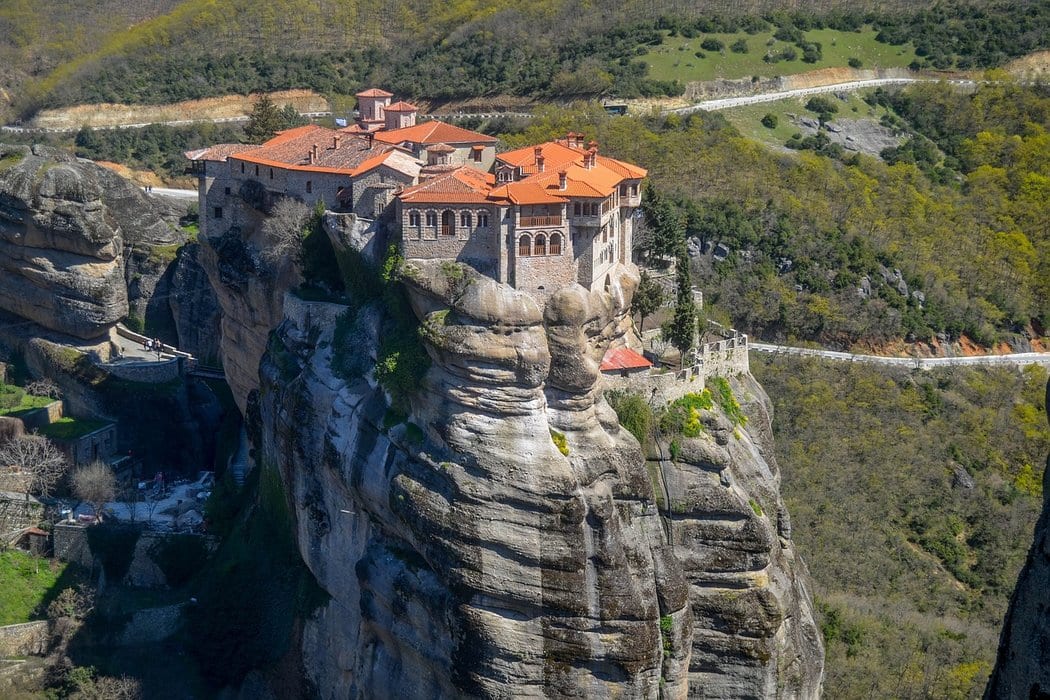
However, the Meteora monasteries are not the most important monasteries in Greece. There is an area in the Chalkidiki peninsula in North Greece, called Mount Athos. This area is home to 20 monasteries, of which 17 are Greek and the remaining three are Russian, Serbian and Bulgarian.
These monasteries have been fully functioning since they were established, and as such Mt Athos is the oldest monastery community in the world. An estimated total of 1,650 monks live there.
You are probably curious why you have never heard of Mt Athos. The main reason is that entrance to the whole area of Mt Athos is not allowed to women!
Similarly to the Vatican in Rome, Mt Athos is an independent state, governed partly by monks and partly by the Greek State. Pilgrims and male visitors must arrange their visit weeks or months in advance.
Experience it yourself by… Taking a cruise
It is possible, however, to take a cruise around the Mt Athos area. While you won’t be able to visit the monasteries themselves, you will get a glimpse of this beautiful and lesser known region of Greece from the boat, and enjoy the little island of Ammouliani.
16.The World’s Deepest Gorge – No, it’s not Samaria Gorge
You have probably heard of Mount Olympus, the home of the Olympian Gods. Do you know, however, that Greece has the deepest gorge in the world in proportion to its width, according to the Guinness Book of Records?
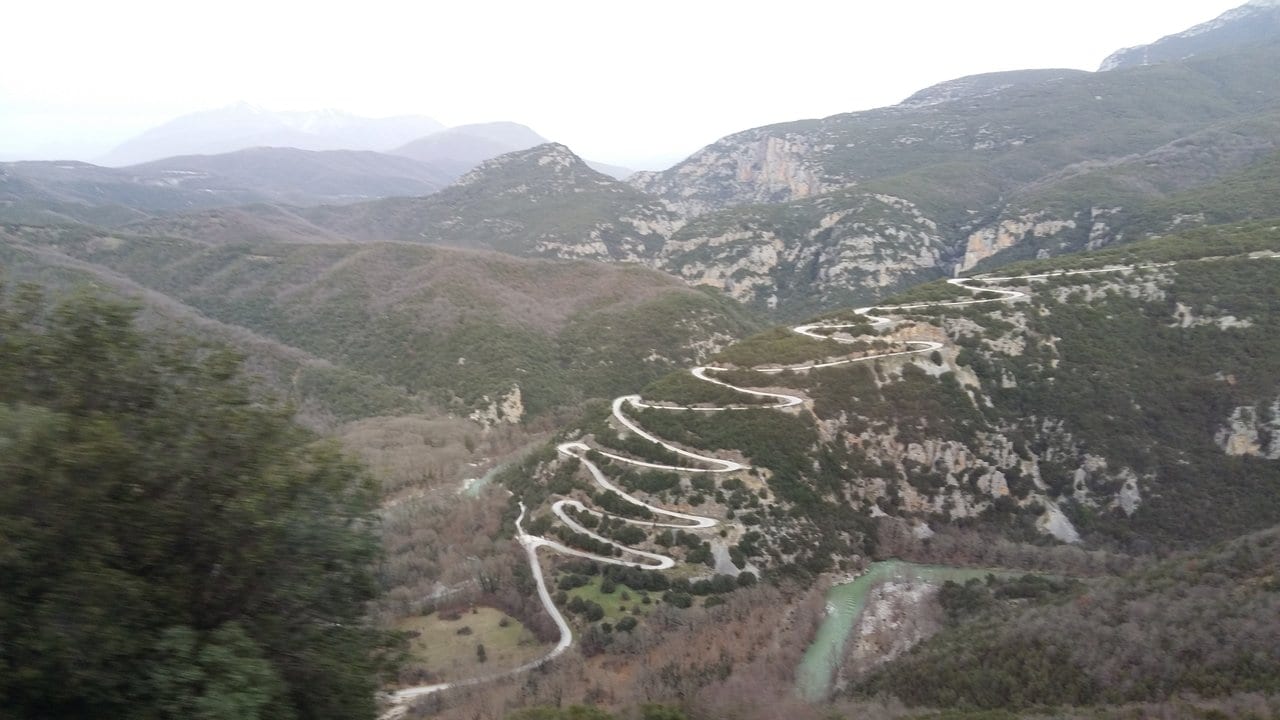
Vikos Gorge is a gorge in Northern Greece, in the Zagori Region. It is located in the Vikos Aoos National Park, on the Pindos Mountain range.
It is about 20 km long, and its depth is almost 1,000 metres in some places! As it has not been affected by tourism, Vikos gorge is home to several endangered species and thousands of different types of plants. Parts of the gorge are estimated to be literally million years old.
You can visit the Vikos gorge independently if you rent a car. The gorge begins around the villages of Koukouli and Monodendri, and ends around the village by the name of Vikos.
There are several viewpoints over the gorge close to Vradeto and Monodendri villages, but it’s best to ask the locals for guidance.
Experience it yourself by… Hiking
It’s also possible to hike through parts of the gorge, though not all trails are easy. If you want to hike, the best way to explore the Vikos gorge is to take an organized hiking trip.
You will get to see the river of Voidomatis, and the landscapes are truly spectacular. If you have only been to places like Athens or Santorini, you will think that you are on a different planet!
17. Zorba the Greek and the sirtaki dance
Ironically, one of the most famous Greek characters has been played on screen by a Mexican actor! Zorba the Greek, a book written by the prominent Greek author Nikos Kazantzakis, was made into a very successful movie back in 1964.
Every fan of Greece is probably familiar with the closing scene, when Alexis Zorbas dances the famous Greek sirtaki dance on the beach. Check it out here on YouTube.
Experience it yourself by… Keeping your ears open
There's no way you will have a vacation in Greece without hearing the song from Zorba at least once. No way!!
18. Filoxenia and Filotimo
Two words that often feature in English articles, filoxenia and filotimo summarize a few of the positive traits that Greeks are famous for.
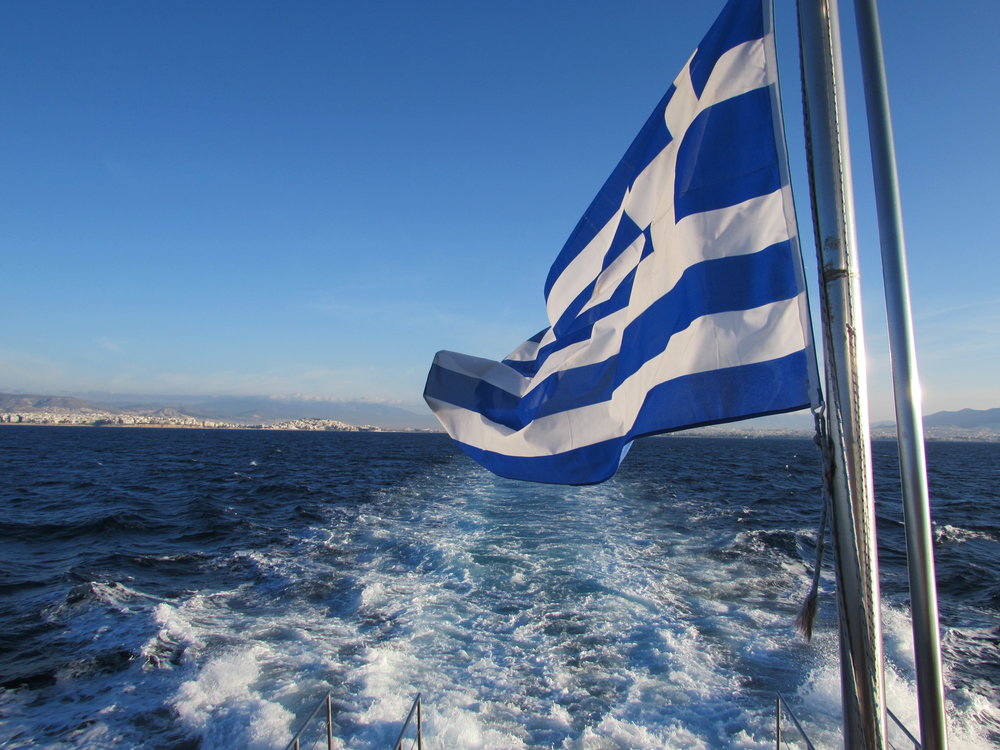
Filoxenia can roughly be translated as hospitality. It literally means loving the foreign / alien / visitor. The concept of Filoxenia was prominent in Ancient Greece, and Zeus was the protector of visitors.
Visitors were sacred, and protected by the gods, and it was everyone’s duty to host travelers.
Filotimo, on the other hand, is a word that can famously not be translated. Roughly speaking, it means the love of honour.
It has to do with a complex array of concepts including pride, respect, courage, justice and honor, as well as hospitality. If you ask a Greek “What is Greece famous for?”, don’t be surprised if they mention filotimo!
Experience it yourself by… A Vacation in Greece
We hope you'll visit Greece and love it here as much as we do! Want to find out more about Greece? Sign up for my free Greece travel guides below.
Next read: What is Athens famous for?
Pin this blog post
If you are a Pinterest user, I'd appreciate if you could share the image below to one of your boards. Thanks!
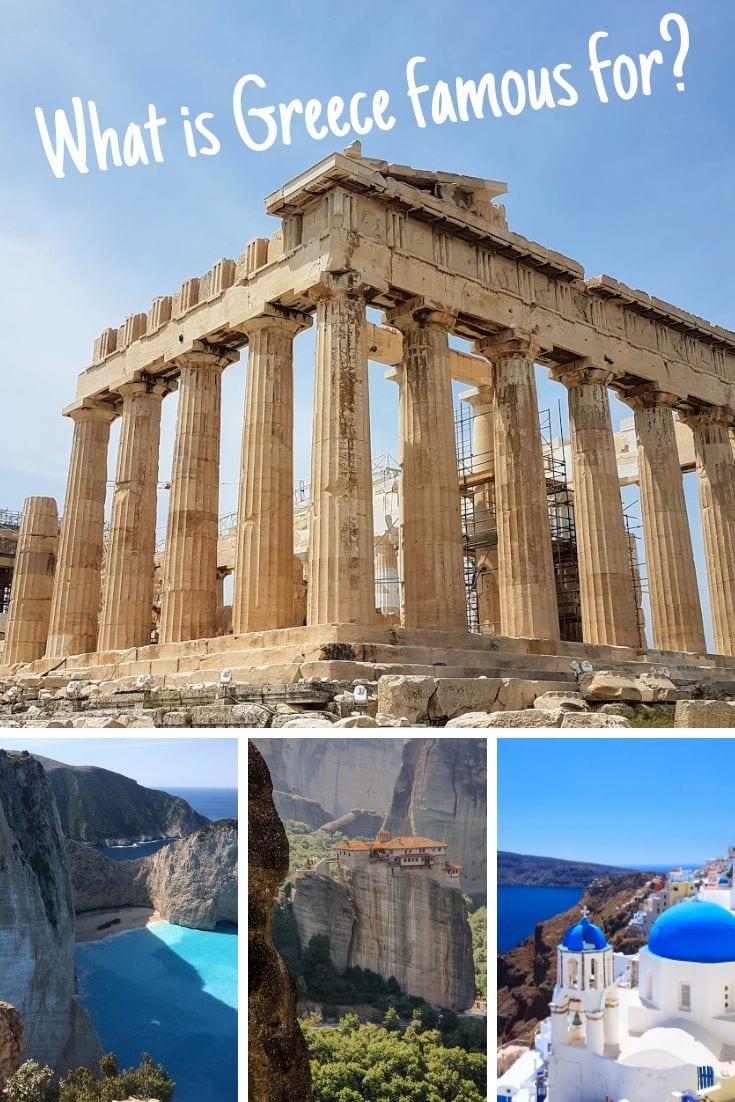
Next read: Best time to visit Greece
FAQ – About what Greece is known for
What is Greece famous for?
Greece is known for being the cradle of Western Civilization, the birthplace of democracy, the Olympic Games, and its ancient history and magnificent temples. Ancient temples in Greece include the Parthenon at the Acropolis in Athens, the Temple of Apollo at Delphi, and the Temple of Poseidon at Sounion.
Who is the most famous person from Greece?
Alexander the Great is the most famous Greek, and during his short life, he created a vast empire. His short life was full of adventures. Born in Pella, Macedonia, in 356 BC, he became king at the age of 20.
What food is Greece famous for?
Look beyond Greek salad and Gyros, and you'll see that Greek cuisine is among one of the most varied in the world. Famous traditional Greek dishes include:
- Dolmades (Stuffed Vines Leaves)
- Fava (Yellow Split Pea Puree)
- Kalamarakia Tiganita (Fried Calamari)
- Keftethakia or Keftethes (Greek Meatballs)
- Moussaka
- Saganaki (Fried Cheese)
- Spanakopita (Spinach Pie)
What were the names of some famous Greek philosophers?
Ancient Greece had dozens of philosophers, many of which we still know today:
- Pythagoras (c. 570-495 BCE)
- Heraclitus (c. 535-475 BCE)
- Democritus (c. 460-370 BCE)
- Empedocles (c. 490-330 BCE)
- Thales (c. 624-546 BCE)
- Aristotle (c. 384-322 BCE)
- Plato (c. 428-348 BCE)
- Socrates (c. 469-399 BCE)
How big is Greece?
Greece has an area of 131,957 km², and a population of 10.72 million.
What is Greece most well known for?
The influence Greek culture, history and heritage has had on the Western world is profound. Ancient Greek philosophy and other schools of thought have had a major impact on mathematics, the arts, and modern medicine, the effect of which can still be felt today.
What's special about Greece?
Greece is known for its countless islands, beautiful beaches, and ancient temples. Famous landmarks such as the Acropolis, Delphi and Epidaurus provide us with a connection to the ancient world, while cosmopolitan islands such as Mykonos host the best parties in Europe!
Why is Greece so popular?
Greece appeals to a wide range of people, with attractions ranging from ancient wonders to the best beaches in the world. Oh, and the weather is fantastic as well!
 – Dave Briggs
– Dave BriggsDave Briggs is an author and travel blogger who has been living in Greece since 2015. He's written hundreds of travel guides and itinerary suggestions for Greece here on Dave's Travel Pages. Follow Dave on social media for more travel ideas from Greece and beyond:
Hi Dave, your travel pages are so helpful! We will definitely be using your guides to Athens, Delphi, Meteora and Milos to prepare for our upcoming trip at the end of September. I am curious why Mount Olympus does not appear in any of your 10 recommended trips, or in this section on what Greece is famous for. We have included it in our 2-week road trip itinerary (Athens, Delphi, Mt Olympus, Meteora, Olympia, Corinth, Milos). Including Mt. Olympus is taking a couple days from a more leisurely visit to Meteora and/or Olympia. Is that a mistake?
Hi Jeanne,
I’m glad you’ve found the guides useful and hope you have a great time in Greece!
Mount Olympus (like Athos) is a place I’ve yet to visit, which is the only reason I’ve left it out of itinerary and trip ideas up until this point.
I know that it is a good area for hiking and outdoor activities, so if that is you thing, it would be a good place to stop by.
Just a couple of footnotes: I’d be more keen on spending extra time in Meteora than Ancient Olympia. Also, don’t underestimate how far away Ancient Olympia over in the Western Peloponnese is from everything else.
Whatever you decide, I’m sure you’ll enjoy yourselves and the different landscapes you’ll be going through!
Thank you! We added an extra night in Meteora. We do have a packed itinerary through the Peloponnese, but we are hoping it works. Will let you know in October!